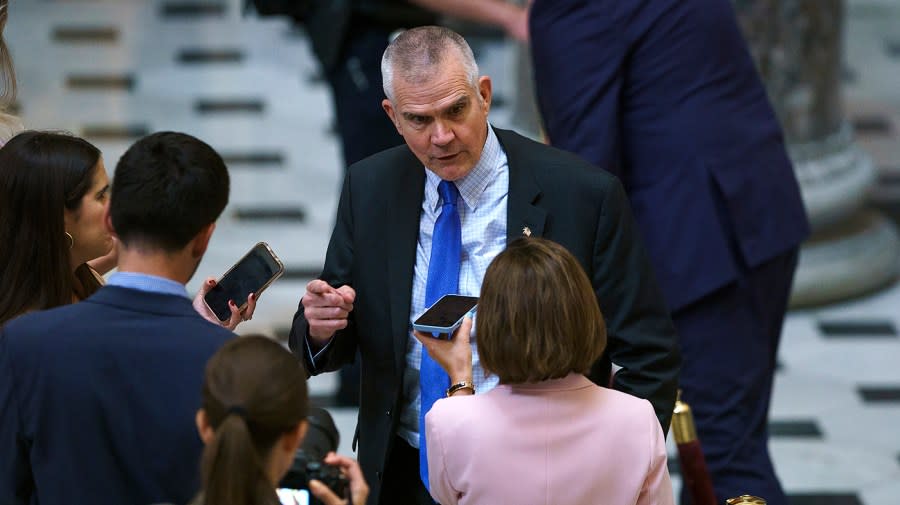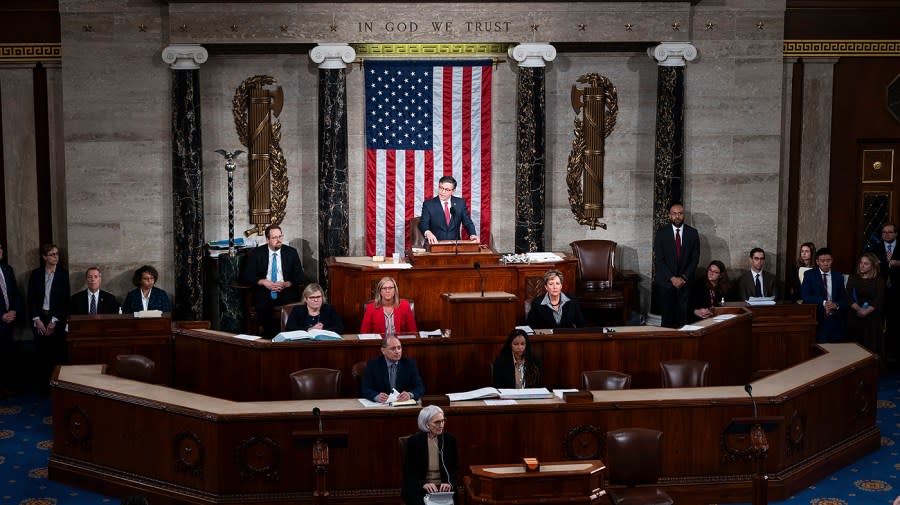House deals with shutdown threat under Speaker Johnson: 5 things to watch

House Republicans are moving quickly to pass appropriations measures under new Speaker Mike Johnson (R-La.) as they seek to stave off a shutdown and impose deeper cuts on government spending.
Passage of the bills would set up negotiations with the Democratic-held Senate, which faces its own challenges in moving 12 appropriations measures.
The House swiftly approved its first funding bill in weeks just days ago after the chamber reopened under Johnson, who won the gavel less than a week ago. The sprawling partisan energy plan is just one of eight bills that Republicans hope to pass out of the House by Nov. 17, when government funding is set to expire.
A stopgap measure will likely be needed to avoid a shutdown.
Here are five things to watch as the House GOP seeks to move forward.
What will hard-line fiscal conservatives do?

Rep. Matt Rosendale (R-Mont.) speaks to reporters as the House votes on whether to remove Speaker Kevin McCarthy (R-Calif.) from his role after a motion to vacate requested by Rep. Matt Gaetz (R-Fla.) on Tuesday, October 3, 2023. (Greg Nash)
Hard-line fiscal conservatives have signaled they’ll afford some grace to Johnson as he adjusts to his new role and works to get the party’s spending bills across the line.
But it’s unclear how long his grace period will last, and a series of GOP Speakers over the last decade have been tripped up by conservatives unhappy over the conference’s spending strategy.
The party previously hoped to pass their 12 annual government funding bills during the summer, but those efforts fell short as then-Speaker Kevin McCarthy (R-Calif.) struggled to unify the party behind those bills amid calls for deeper cuts from conservatives.
Johnson pitched a “working group” to his colleagues ahead of assuming the Speaker’s gavel aimed at addressing members’ concerns with the party’s agricultural funding bill for fiscal 2024.
The bill failed to pass earlier this year due to opposition from moderate Republicans over language targeting access to an abortion pill.
How deep will the cuts be?

Rep. Mike Johnson (R-La.) is seen before a vote for Speaker in the House Chamber on Wednesday, October 25, 2023. (Greg Nash)
There is much uncertainty in the House GOP about what the overall top-line level for the party’s government funding bills will look like.
GOP negotiators had already written the bills to funding levels lower than the budget caps agreed to as part of the Fiscal Responsibility Act (FRA) brokered between McCarthy and the Biden administration earlier this year. That legislation raised the nation’s borrowing limit, but many House conservatives expressed anger over the final bill.
Top Stories from The Hill
Colleges face competing pressures on campus safety, free speech amid Israel-Hamas war
House deals with shutdown threat under Speaker Johnson: 5 things to watch
Kinzinger says family disowned him over loss of Hannity’s trust
Christie says Trump will be convicted in slew of legal battles: ‘It’s over’
Conservatives had previously rallied behind a top-line level of $1.471 trillion for the party’s annual funding bills, but an intraparty compromise was later reached in September for $1.526 trillion as tensions simmered.
Republicans touted the deal at the time, saying the proposal would pave the way for about $60 billion in additional cuts in the funding bills. But there are still questions around where that commitment stands following McCarthy’s removal.
Ukraine, Israel and the border

Rep. Thomas Massie (R-Ky.) arrives for a House Republican Conference meeting on Wednesday, October 11, 2023. (Greg Nash)
Congress is eyeing supplemental funding for Ukraine and Israel in the coming weeks, as lawmakers from both parties pressed support for emergency aid.
Some lawmakers in both parties want to pass aid for both countries as part of a single package, while opponents of Ukraine aid insist they must be separated.
Republicans are also insisting that the legislation includes measures aimed at boosting security at the southern border.
The House GOP introduced legislation Monday that would pay for more than $14 billion in aid for Israel with cuts to funding for the IRS.
That legislation might actually be scored as adding to the deficit, however, since the Congressional Budget Office found similar proposed cuts would reduce tax revenue brought in by the IRS.
Maya MacGuineas, president of the Committee for a Responsible Federal Budget, told The Hill on Monday that she backs efforts to offset spending. But she said “the IRS funding would save money, so, ultimately, this would add more to the debt.”
In a social media post earlier Monday, Rep. Thomas Massie (R-Ky.) said he’s opposed to aid for Ukraine and Israel even if they are offset.
“If Congress sends $14.5 billion to Israel, on average we’ll be taking about $100 from every working person in the United States,” Massie wrote on X, the platform formerly known as Twitter. “This will be extracted through inflation and taxes. I’m against it.”
Next shutdown punt

Speaker-elect Mike Johnson (R-La.) gives a speech following his election to Speaker in the House Chamber on Wednesday, October 25, 2023. (Greg Nash)
Congress currently has until Nov. 17 to pass legislation to keep the government funded or risk a shutdown.
Members on both sides of the aisle expect Congress will pass a short-term funding bill to keep the government funded at levels last approved by lawmakers in late 2022 to buy time for spending talks.
But it’s unclear what the measure will look like, as some Republicans are pressing for immediate cuts and border changes as part of a stopgap funding bill.
The 1 percent penalty

Rep. Jim Jordan (R-Ohio) is seen in the House Chamber following the second vote for Speaker of the House on Wednesday, October 18, 2023.
The debt ceiling bill earlier this year included an incentive for Congress to get its work done. It says that if Congress crosses into next year without passing its 12 funding bills for fiscal 2024, an across-the-board 1 percent cut on defense and nondefense programs will be imposed.
But the cuts wouldn’t be expected to take effect until April. Some Republicans want the next stopgap bill to extend through April to put more pressure on lawmakers.
Rep. Jim Jordan (R-Ohio) argued last week that Republicans would have more “leverage” with a stopgap bill running into April.
“I would prefer long, to use as leverage the potential trigger cut that happens on April 30, the 1 percent 1 percent,” Jordan told The Hill. “That gives us the incentive to do our job.”
Johnson also signaled some openness to the idea this past week but went further to suggest Republicans might press for changes that would allow the cuts to become effective in January instead as part of a stopgap measure.
“There may be some conditions put on that [stopgap measure], perhaps that 1 percent spending cut across the board instead of becoming effective in April,” Johnson said.
“Maybe we’d make that Jan. 15 to incentivize the Senate to do their work, but I don’t want to get too deep in the weeds on the details of it because people sort of get lost in all of that, but I’ll tell you that we’re working in earnest to get it done.”
For the latest news, weather, sports, and streaming video, head to The Hill.

